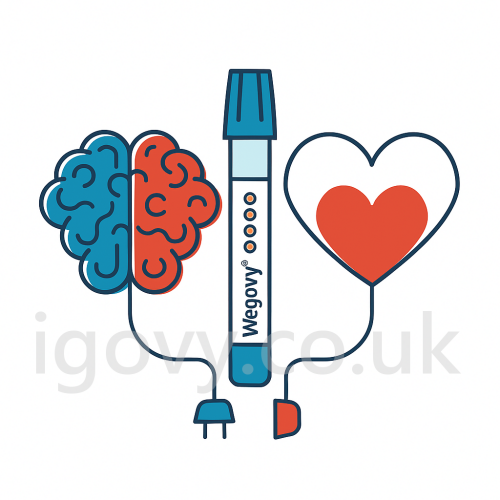Wegovy and Heart Disease: What UK Patients Should Know
If you’re living in the UK and managing weight alongside heart health, you may have heard about Wegovy. But what exactly is the link between Wegovy and heart disease?
This guide explains how Wegovy works, what recent research shows, and how the medication may support people who are overweight or obese and have an existing cardiovascular condition.
What Is Wegovy?
Wegovy® is a prescription-only injectable medication containing semaglutide, a GLP-1 receptor agonist. It was originally approved in the UK for weight loss and weight management in people with obesity or overweight, to be used alongside a reduced-calorie diet and increased physical activity.
Now, following new clinical evidence, Wegovy has been approved in the UK to help reduce the risk of serious heart problems in adults with certain cardiovascular conditions.
Wegovy and Heart Disease?
The term “cardiovascular disease” (CVD) includes a range of conditions that affect the heart or blood vessels—such as heart attack, stroke, and peripheral artery disease. These conditions are often linked to obesity, poor diet, and other lifestyle factors.
Wegovy does not treat heart disease directly. However, research has shown that it can reduce the risk of major cardiovascular events in people who already have heart disease and a BMI of 27 kg/m² or higher.
Approved Use in the UK
As of 23 July 2024, the UK’s Medicines and Healthcare products Regulatory Agency (MHRA) approved semaglutide (Wegovy) to help prevent:
- Cardiovascular death
- Non-fatal heart attack
- Non-fatal stroke
This makes Wegovy the first weight-loss drug in the UK to be licensed specifically for the prevention of serious cardiovascular events in people living with heart disease and excess weight.
What Does the Research Say About Wegovy and Heart Disease?
Wegovy’s new approval is based on data from a large international clinical trial that included more than 17,600 adults with pre-existing cardiovascular disease.
Participants were randomly assigned to receive either Wegovy (2.4 mg weekly) or a placebo. Over roughly five years:
- 6.5% of participants who took Wegovy had a major cardiovascular event
- 8% of those on placebo experienced one
- That’s a 20% relative reduction in risk
These results were observed in people without diabetes, giving a clearer picture of Wegovy’s effects on heart health separate from blood sugar control.
How Does Wegovy Work?
Semaglutide works by mimicking the GLP-1 hormone, which plays a role in controlling appetite, blood sugar, and digestion. It:
- Helps you feel full sooner and for longer
- Slows digestion
- Lowers blood sugar levels after eating
- Reduces hunger and calorie intake
These combined effects support sustained weight loss, which can ease pressure on the heart and blood vessels.
How Is Wegovy Taken?
Wegovy is available in the UK as a once-weekly injection using a pre-filled pen. It is used alongside:
- A reduced-calorie diet
- Increased physical activity
- Ongoing support from healthcare professionals
Because it is a prescription medicine, only a qualified healthcare provider can decide if Wegovy is appropriate for your situation.
Are There Any Side Effects?
The most common side effects include:
- Nausea
- Vomiting
- Diarrhoea
- Constipation
These are usually mild and may improve over time. If you experience any side effects, speak to your GP or pharmacist. You can also report concerns through the MHRA Yellow Card Scheme.
What Should You Do Next?
If you are overweight or obese and have heart disease, and you’re wondering if Wegovy might be suitable for you, the next step is to speak with your doctor or healthcare team. They can help determine if this treatment fits your individual needs and explain any risks or benefits.
In Summary: Wegovy and Heart Disease
For people in the UK living with both excess weight and cardiovascular disease, Wegovy now offers a new, evidence-based option to reduce the risk of serious heart events. While it isn’t a cure, it may play a key role in long-term heart health when used alongside healthy lifestyle changes and ongoing medical support.
